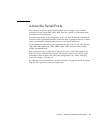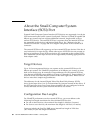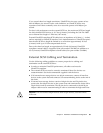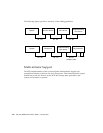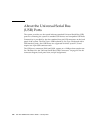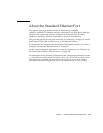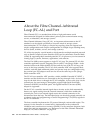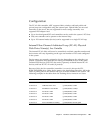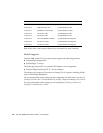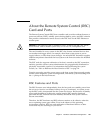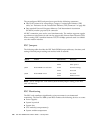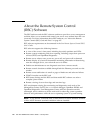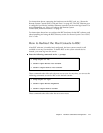
104 Sun Fire 280R Server Owner’s Guide • January 2001
About the Fibre Channel-Arbitrated
Loop (FC-AL) and Port
Fibre Channel (FC) is a standard that defines a high-performance serial
interconnection designed for bidirectional, point-to-point communication among
servers, workstations, and storage systems.
Fibre Channel-Arbitrated Loop (FC-AL), an important enhancement to the FC
standard, was developed specifically to meet the needs of storage system
interconnections. FC-AL employs a simple loop topology that can support both
simple configurations and complex arrangements of multiple loops attaching many
devices (hubs, switches, servers, and storage systems).
FC-AL devices employ a serial interface, which transfers multiple standard protocols
such as Small Computer System Interface (SCSI) and Asynchronous Transfer Mode
(ATM). By supporting these standard protocols, FC-AL preserves your investment in
existing legacy systems, firmware, applications, and software.
The Sun Fire 280R system supports a single FC-AL loop. The internal FC-AL disk
controller application specific integrated circuit (ASIC)—the QLogic 2200A—is the
interface between the 64-bit 66-MHz PCI bus and the rest of the FC-AL loop, and
serves as the loop controller. The FC-AL disk controller ASIC also supports fabric
switches, and thus both additional public and private loops are configurable using
the external port. PCI adapter cards can also be on the same loop as the QLogic
2200A controller ASIC.
The FC-AL host controller ASIC provides a 64-bit, 66-MHz Extended PCI (EPCI )
interface and the disk drives are connected to the loop through a hub. Access to the
loop for the disk drives is through the FC-AL backplane. Access to the loop via the
external port for mass storage is through the copper High-Speed Serial Data
Connector (HSSDC) on the back panel. No Gigabit Interface Converter (GBIC)
adapter is supported.
On the FC-AL controller, internal signal detect circuitry on the hub automatically
detects any signal coming from the external connector, which then enables the
external port. Lack of an external signal causes the external connection to be
disconnected from the loop. The individual ports can also be bypassed manually via
a software probe and programming a General Programming I/O (GPIO) register in
the FC-AL controller.
The host controller implements the FC protocol through a microcoded engine. The
memory for the firmware is external and is implemented with synchronous
128-Kbyte static random access memory (SRAM). For the connector diagrams, back
panel icon, and pin assignments, see “Reference for the Fibre Channel-Arbitrated
Loop (FC-AL) Port Connector” on page 214.




